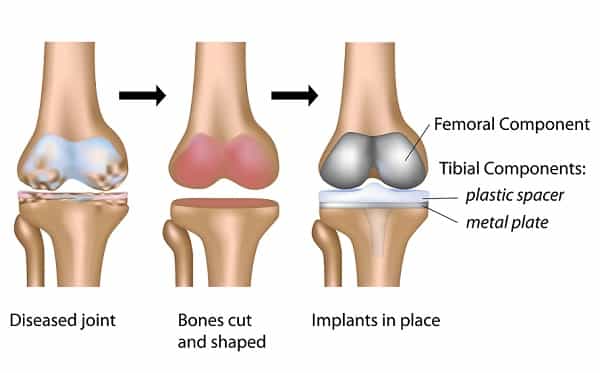Total Knee Replacement

What is Total Knee Replacement Surgery?
Total Knee Replacement surgery is an operation that involves replacing a worn out knee with an artificial joint.
The surgery involves refashioning the ends of the femur and tibia bones which form the knee joint in a very advanced and technical manner. The artificial knee joint is then placed on the cut ends of the bones and a high performance polyethylene liner is placed between the two metal ends of the knee joint.
Implants And Techniques Used
The knee joint used by Mr Mahaluxmivala and the clinic is an implant which has one of the best longevities in the world. The techniques of implantation and approach are also aimed at providing the best outcomes for patient results backed by true international evidence based practice.
What Are The Causes For Knee Replacement?
- Advanced or severe osteoarthritis of that knee (most common reason).
- Rheumatoid arthritis after medical or drug treatment has been tried and exhausted.
- Severe injuries to knee leading to severe arthritis.
- Patients who have undergone surgery for fractures previously to the femur or tibia bones and the residual sequel of that is now severe osteoarthritis of the knee.
- Patients who have had their cartilage removed in the past by old fashioned open methods.
Symptoms
- Severe pain in knee joint including a very limited walking distance of about ten to fifteen minutes.
- Pain all over the knee or complain of pain in the inner or outer aspect of the knee.
- The knee pain may be worse while getting up from a sitting position and going up or coming down stairs. The patient may complain that stairs are negotiated one at a time. In extreme cases patients may say they have to go up “on all fours”.
- The patient may complain of locking or catching within the knee and that the knee “gives way or collapses” under them.
- The pain is typically worse on activity, but may be present at rest as well.
- The knee feels swollen and inflamed and the patient may also report that he or she has become more “knock kneed or bow legged”.
Diagnosis
- Patient medical history and complete examination.
- X-ray of the knee which includes three specialised views (standing, bent and flexed views) which show arthritis that would not normally get picked up by routine x-rays done by non-knee surgeons, where patients are commonly told that their knee arthritis is not severe, when in fact it may be.
Animation of TKR
When Will I Do A TKR?
Treatment
Pre Procedure
During the “Pre Admission Appointment”, blood and other tests are carried out and patient history taken to ensure safety and suitability for surgery.
Advice regarding how to prepare one’s self for upcoming surgery will be provided including physiotherapy advice before and after surgery.
The patient is admitted on the day of surgery and Mr Mahaluxmivala will always see the patient before the surgery and clarify consent for surgery. The anaesthetist will also see the patient and discuss the best and safest method for that patient.
The Procedure Itself
As shown in the video above Animation of TKR (Total Knee Replacement), the surgery involves refashioning the ends of the femur and tibia bones which form the knee joint in a very advanced and technical manner. The artificial knee joint is then placed on the cut ends of the bones and a high performance polyethylene liner is placed between the two metal ends of the knee joint.
The time of actual surgery is between 60 and 120 minutes, followed by recovery time where the patient is monitored very closely after the operation.
However, once patients relatives are aware of the operation and recovery time frame, their anxiety for loved ones is lessened knowing that safe care is given to them at all times.
We are based at the Rivers Private Hospital in Sawbridgeworth, Hertfordshire.
